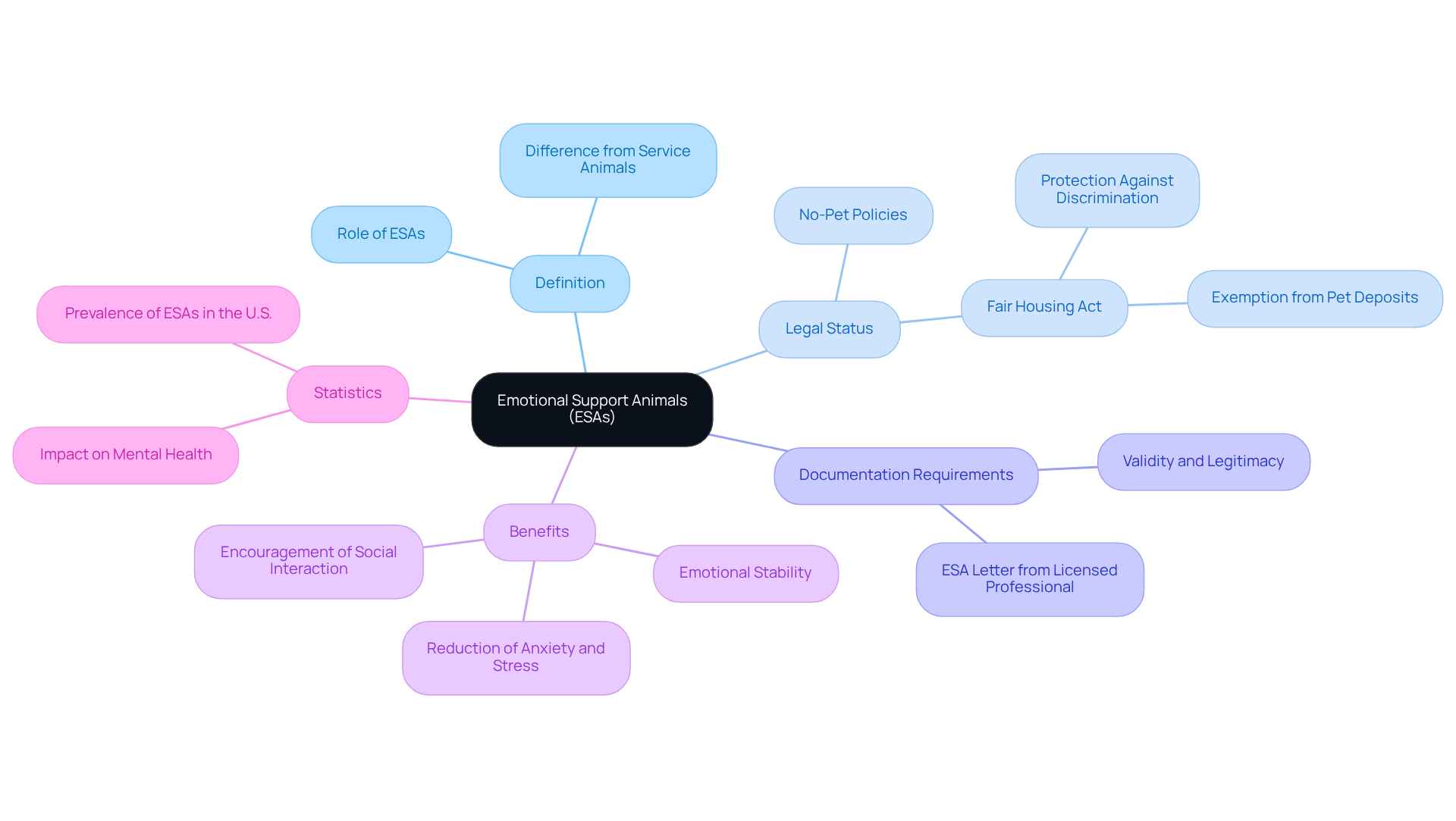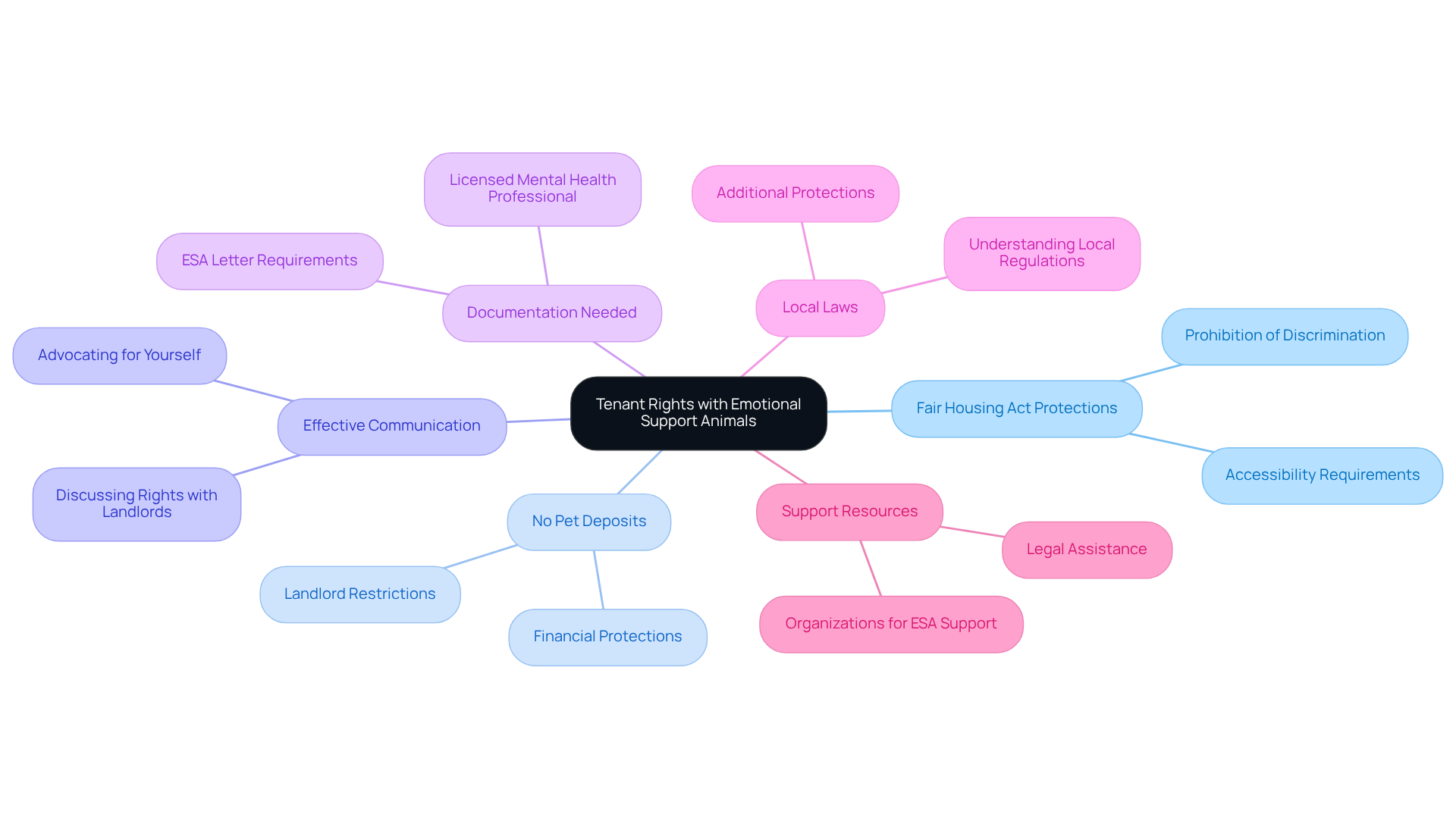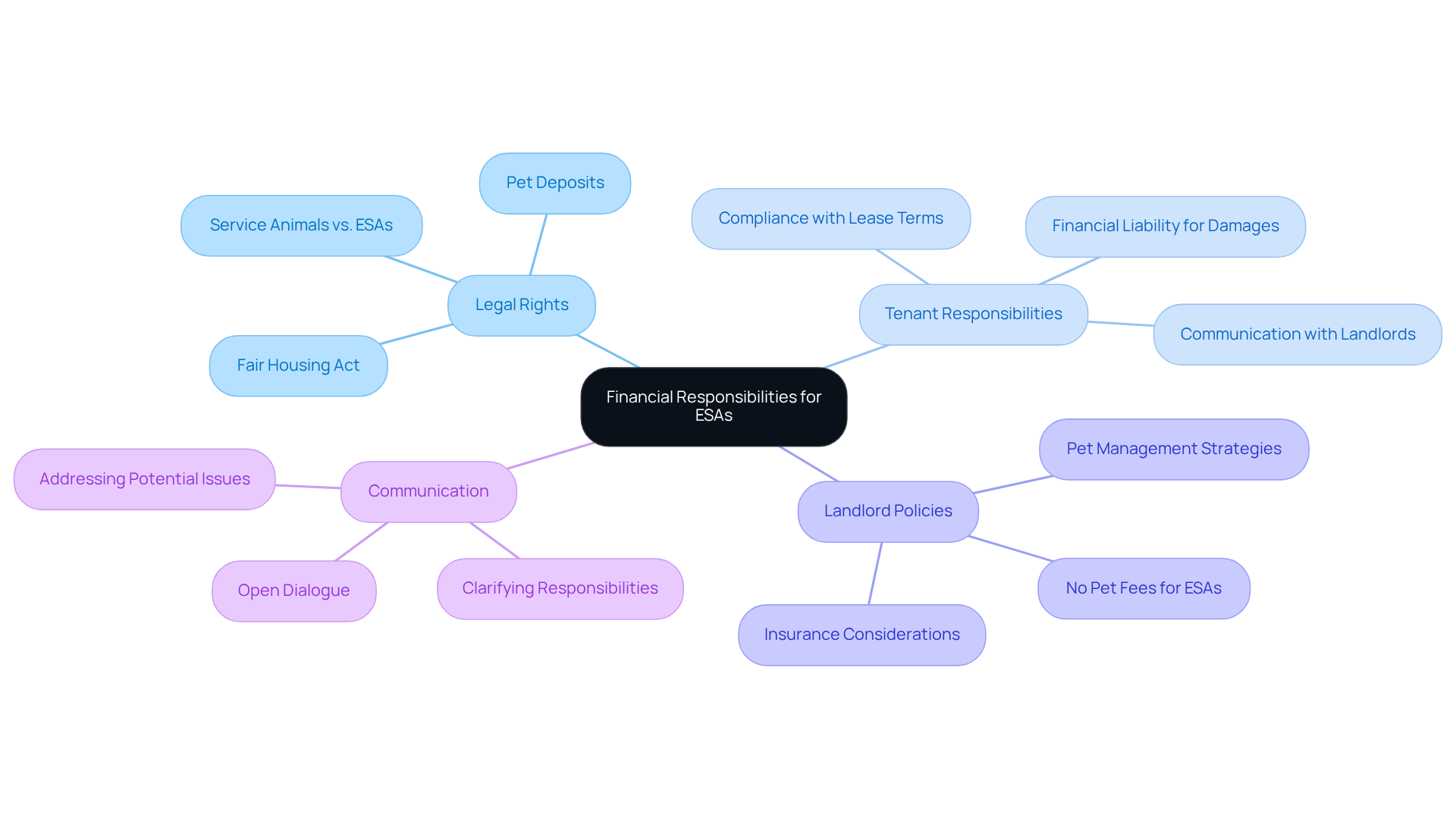

Can a Landlord Charge a Pet Deposit for an Emotional Support Animal?
by Lena Park
Last updated: August 17, 2025
Verified and Approved by:
Angela Morris,
MSW, LCSW
Fact Checked

Overview
For individuals facing emotional or psychological disabilities, the journey can often be filled with challenges. It’s important to understand that under the Fair Housing Act, landlords cannot charge a pet deposit for an emotional support animal (ESA). This recognition is crucial, as ESAs serve as essential accommodations that help individuals navigate their mental health struggles.
While tenants are responsible for any damages caused by their ESA, the law ensures that they are protected from additional fees specifically related to their emotional support needs. This protection allows individuals to meet their mental health requirements without the added burden of financial strain.
Remember, you are not alone in this journey, and there is support available to help you thrive.
Introduction
Understanding the legal landscape surrounding Emotional Support Animals (ESAs) is vital for tenants who seek comfort and companionship in their homes. Many individuals face emotional challenges, and the recognition of the mental health benefits provided by ESAs is growing. It is essential to know your rights under the Fair Housing Act as you navigate these waters.
However, a pressing question lingers: can landlords impose pet deposits for these crucial companions? This article explores the nuances of ESA regulations, offering insights that empower tenants to advocate for their needs while gently addressing potential challenges in securing housing accommodations.
Understand Emotional Support Animals and Their Legal Status
Emotional Support Animals (ESAs) serve as compassionate companions, providing comfort and emotional assistance to those grappling with mental health challenges. Many individuals face significant emotional hurdles, and the presence of an ESA can make a profound difference in their daily lives. Unlike assistance animals, which are specially trained to perform tasks for individuals with disabilities, ESAs do not require specialized training. This distinction is important as it highlights the unique role ESAs play in supporting emotional well-being.
The Fair Housing Act (FHA) recognizes the essential role of emotional support animals as vital accommodations for individuals with emotional or psychological disabilities. This means that landlords must allow ESAs in housing units, even in properties that enforce no-pets policies. However, to effectively assert these rights, having appropriate documentation is crucial. A valid ESA letter from a licensed health professional not only confirms the necessity of an emotional support animal but also clarifies whether a landlord can charge a pet deposit for an emotional support animal, as those with ESAs are exempt from such charges under the FHA.
Did you know that about 18% of pet owners in the U.S. have emotional support animals? This statistic reflects a growing awareness of the psychological health benefits that ESAs can provide. Real-world stories illustrate how tenants have successfully utilized ESA letters to secure housing, reinforcing the importance of understanding these legal protections.
At Wellness Wag, we are dedicated to empowering individuals by offering accessible consultations and expert guidance in obtaining legitimate ESA letters. We believe that everyone deserves to experience the transformative companionship that emotional support animals offer. Let us help you navigate this journey, ensuring that you can find the support you need during challenging times.

Know Your Rights as a Tenant with an Emotional Support Animal
As a tenant with an Emotional Support Animal (ESA), you deserve to feel secure and supported in your living situation. Under the Fair Housing Act, you are entitled to specific protections that acknowledge the importance of your ESA for your psychological well-being.
It’s crucial to know whether a landlord can charge a pet deposit for an emotional support animal, as property owners cannot impose extra pet charges or deposits for ESAs, which are recognized as vital accommodations for those facing mental health challenges. This legal framework is in place to ensure that individuals with disabilities are not discriminated against due to their condition or the presence of their ESA.
Effective communication with your property owner is key to navigating this process. Providing the necessary documentation, such as a valid ESA letter from a licensed mental health professional, can help clarify your rights and reinforce your position. Unfortunately, recent surveys reveal that many landlords remain unaware of these regulations, which can lead to instances of discrimination against ESA tenants. It’s important to advocate for yourself and your needs.
Additionally, familiarizing yourself with local laws and regulations can empower you further, as they may offer additional protections or stipulations. Understanding your rights not only strengthens your position but also fosters a sense of confidence when advocating for your ESA in housing situations. By being informed, you can navigate potential challenges with assurance and ensure that your psychological health needs are met without undue financial burden.
Remember, you are not alone in this journey; support is available to help you along the way.

Request Housing Accommodation for Your Emotional Support Animal
Requesting housing accommodation for your Emotional Support Animal can be an important step in managing your emotional well-being. Here’s how to navigate this process with care:
-
Gather Documentation: Start by obtaining a valid ESA letter from a licensed health professional. This letter should clearly outline your need for the animal, including the specific mental health condition it addresses. Having this documentation is crucial in articulating your situation.
-
Draft a Request Letter: Compose a formal letter to your property owner, including your name, address, and a clear statement requesting accommodation for your ESA. Attaching your ESA letter will provide the necessary documentation to support your request.
-
Submit Your Request: Deliver the letter in person or via certified mail to ensure it is received and documented. This step is vital in establishing a record of your request, showing your commitment to the process.
-
Follow Up: If you do not receive a response within a reasonable timeframe, gently follow up with your property owner to inquire about the status of your request. This demonstrates your dedication and helps keep the lines of communication open, which can be reassuring during this time.
-
Be Prepared for Discussion: Your property owner may wish to discuss your request further. Be ready to describe how your ESA supports your emotional health and well-being; sharing your experiences can assist in fostering a positive outcome.
Understanding the legal safeguards under the Fair Housing Act is essential. It is important to remember that property owners cannot impose extra charges for emotional support animals, leading to the inquiry of whether can a landlord charge a pet deposit for an emotional support animal. By providing proper documentation and engaging in proactive communication, you can significantly enhance your chances of securing the necessary accommodations. You are not alone in this journey, and there is support available to help you through it.

Evaluate Financial Responsibilities: Can Landlords Charge for ESAs?
Under the Fair Housing Act, it’s important to recognize that the question of whether a landlord can charge a pet deposit for an emotional support animal is addressed, as property owners cannot impose such charges. These animals are not just pets; they are essential companions for individuals facing psychological health conditions. Unlike service dogs, which are specifically trained and have defined legal rights under the ADA, emotional support animals provide vital emotional comfort and assistance, although they do not share the same access rights. It’s crucial to understand that while tenants are financially responsible for any damages their ESA may cause, just like they would be for any other tenant-related damages, the vast majority of ESA owners practice responsible pet ownership. In fact, industry experts indicate that fewer than 10% of pets cause damages.
Some property owners choose not to impose fees for emotional support animals, as they are aware that the question of whether a landlord can charge a pet deposit for an emotional support animal is a significant consideration for tenants’ mental well-being. This compassionate approach can lead to stronger landlord-tenant relationships and improved tenant retention. For instance, a property owner who waives charges for emotional support animals may attract a broader range of applicants, as many individuals seek pet-friendly housing options.
Open communication between tenants and landlords about the presence of an ESA is essential. This dialogue fosters understanding and can help clarify responsibilities while proactively addressing any potential issues. Ultimately, while ESAs offer profound emotional support, it’s vital for tenants to ensure their animals do not cause disturbances or damages, thereby fulfilling their financial obligations under the lease agreement. Remember, you are not alone in this journey; there is support available for you and your beloved companion.

Conclusion
Understanding the rights associated with Emotional Support Animals (ESAs) is vital for tenants seeking emotional stability through their presence. The Fair Housing Act ensures that individuals with ESAs are not subjected to additional pet deposits or fees, recognizing these animals as essential companions for mental health support. This legal framework empowers tenants to advocate for their needs while navigating housing situations.
Many individuals face emotional challenges that can feel overwhelming. The presence of an ESA can provide significant comfort, serving as a source of support during difficult times. Key insights from the article highlight the necessity of appropriate documentation, such as a valid ESA letter, and effective communication with landlords. By being informed about their rights and responsibilities, tenants can confidently request accommodations for their ESAs.
Fostering a positive dialogue with property owners can enhance relationships and promote understanding, ultimately benefiting both parties. The significance of recognizing ESAs extends beyond legalities; it emphasizes the importance of mental well-being and the role these animals play in supporting individuals through challenging times. Tenants are encouraged to take proactive steps in understanding their rights and seeking support when necessary.
Imagine a living environment where you feel nurtured and supported. By advocating for themselves and their emotional support animals, individuals can create such an atmosphere, free from the burden of unnecessary financial strain. Remember, you are not alone in this journey; support is available, and your emotional health is worth the effort.
Frequently Asked Questions
What are Emotional Support Animals (ESAs)?
Emotional Support Animals (ESAs) are compassionate companions that provide comfort and emotional assistance to individuals facing mental health challenges. Unlike assistance animals, ESAs do not require specialized training.
What is the legal status of ESAs under the Fair Housing Act (FHA)?
The Fair Housing Act recognizes ESAs as essential accommodations for individuals with emotional or psychological disabilities, allowing them to live in housing units even where no-pets policies are enforced.
What documentation is needed to assert rights regarding ESAs?
A valid ESA letter from a licensed health professional is necessary to confirm the need for an emotional support animal and to clarify whether a landlord can charge a pet deposit, as those with ESAs are exempt from such charges under the FHA.
How common are Emotional Support Animals among pet owners in the U.S.?
Approximately 18% of pet owners in the U.S. have emotional support animals, indicating a growing awareness of the psychological health benefits that ESAs can provide.
How can Wellness Wag assist individuals seeking ESAs?
Wellness Wag offers accessible consultations and expert guidance in obtaining legitimate ESA letters, helping individuals navigate the process to find the support they need during challenging times.
Certify Your Emotional Support Animal Today

Why You Can Rely on Us?
At Wellness Wag, we believe your pet deserves care rooted in both science and compassion. Each article is carefully researched, written in clear language for pet owners, and then reviewed by qualified professionals to ensure the information is evidence-based, current, and practical for real-life care. Our goal is to help you feel confident in making informed decisions about your pet’s health and well-being.
Reviewed by
Angela Morris, MSW, LCSW
Angela is a licensed clinical social worker with 20 years of experience in patient advocacy and community mental health. She has assisted numerous clients with ESA evaluations and brings a deep understanding of disability accommodations, ensuring that all information is accurate, supportive, and practical.

Written by :
Lena Park
Last Updated :
August 17, 2025












